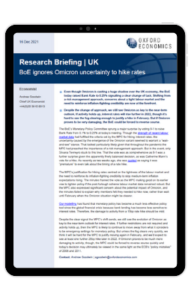UK BoE ignores Omicron uncertainty to hike rates

Even though Omicron is casting a huge shadow over the UK economy, the BoE today raised Bank Rate to 0.25% signalling a clear change of tack. Shifting from a risk management approach, concerns about a tight labour market and the need to reinforce inflation-fighting credibility are now at the forefront. Despite the change of approach, we still see Omicron as key to the near-term outlook.
What you will learn:
- Though the strength of recent labour market data had fulfilled the criteria set by the MPC for hiking interest rates, the uncertainty caused by the emergence of the Omicron variant seemed to warrant a “waitand-
see” stance. - If activity holds up, interest rates will rise further in 2022, though it’s
hard to see the fog clearing enough to justify a hike in February. - But if Omicron proves to be very damaging, the BoE could be forced to reverse course.
Tags:
Related research

Post
Nowcast shows wage growth slowing sharply
Our sentiment data, developed with Penta, suggests that UK private sector wage growth slowed sharply in March and early-April. If official data mirrors our sentiment indicator, it should keep the Monetary Policy Committee on track to cut interest rates in the summer.
Find Out More
Post
The euro and depreciation – shake, shake it off
Our new forecast assumes a slower euro appreciation against the dollar over the coming years than we previously anticipated. Relative productivity, terms of trade, and the current account will likely be less supportive of the euro than we thought. In addition, a stronger stock market than initially envisaged will attract more financial flows into the US than we had expected.
Find Out More